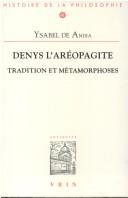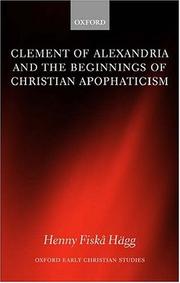| Listing 1 - 6 of 6 |
Sort by
|
Book
ISBN: 9782705668907 270566890X Year: 2009 Publisher: Paris : Hermann,
Abstract | Keywords | Export | Availability | Bookmark
 Loading...
Loading...Choose an application
- Reference Manager
- EndNote
- RefWorks (Direct export to RefWorks)
Wisdom --- Negative theology --- Sagesse --- Théologie négative --- Religious aspects --- Catholic Church --- Early works to 1800 --- Aspect religieux --- Eglise catholique --- Ouvrages avant 1800 --- Early works to 1800.
Book
ISBN: 9789042923478 9042923474 Year: 2010 Volume: 45 Publisher: Leuven [Belgium] ; Walpole, MA : Peeters,
Abstract | Keywords | Export | Availability | Bookmark
 Loading...
Loading...Choose an application
- Reference Manager
- EndNote
- RefWorks (Direct export to RefWorks)
Negative theology --- Théologie négative --- Christianity --- History of doctrines --- Christianisme --- Histoire des doctrines --- Jesus Christ --- History of doctrines. --- Christianity. --- Théologie négative --- Negative theology - Christianity. --- Jesus Christ - History of doctrines.

ISSN: 02497980 ISBN: 2711619036 9782711619030 Year: 2006 Publisher: Paris Vrin
Abstract | Keywords | Export | Availability | Bookmark
 Loading...
Loading...Choose an application
- Reference Manager
- EndNote
- RefWorks (Direct export to RefWorks)
Pseudo-Dionysius the Areopagite --- Pseudo-Dionysius, --- Mysticism --- Negative theology --- Mysticisme --- Théologie négative --- History --- Christianity --- History of doctrines. --- Histoire --- Christianisme --- Histoire des doctrines --- Influence. --- Pseudo-Dionysius --- pseudo-Dionysius Areopagita --- Dionysius Areopagita --- Denys l'Aréopagite --- Denys the Areopagite --- Dionysius de Areopagiet --- Dionysius --- Dionigi, --- Dionisiĭ, --- Dionisio, --- Dionysios, --- Dionysius Areopagita, --- Dionysius Mysticus --- Dionysius, --- Pseudo-Denys, --- Pseudo-Dionigi, --- Pseudo-Dionisiĭ, --- Pseudo Dionisio, --- Psevdo-Dionise, --- Psevdo-Dionisii︠a︡,

ISBN: 271161817X 9782711618170 Year: 2006 Volume: 57 Publisher: Paris : Vrin,
Abstract | Keywords | Export | Availability | Bookmark
 Loading...
Loading...Choose an application
- Reference Manager
- EndNote
- RefWorks (Direct export to RefWorks)
Cognoscibilité --- 2 THOMAS AQUINAS:231 --- 2 THOMAS AQUINAS:231 Godsdienst. Theologie-:-God. De Deo uno et trino:--dogmatisch--THOMAS AQUINAS --- Godsdienst. Theologie-:-God. De Deo uno et trino:--dogmatisch--THOMAS AQUINAS --- Negative theology --- God --- Théologie négative --- Dieu --- History of doctrines --- Name --- Knowableness --- Histoire des doctrines --- Nom --- Thomas, --- Thomas d'Aquin (saint ; 1225-1274) --- Théologie négative --- Thèses et écrits académiques --- Moyen âge

ISBN: 2701010721 9782701010724 Year: 1984 Volume: nouv. sér., 42. Publisher: Paris : Beauchesne,
Abstract | Keywords | Export | Availability | Bookmark
 Loading...
Loading...Choose an application
- Reference Manager
- EndNote
- RefWorks (Direct export to RefWorks)
Métaphysique --- Incarnation --- Negative theology --- Metaphysics --- Théologie négative --- Métaphysique --- History of doctrines --- Histoire des doctrines --- Eckhart, --- Mysticism --- Philosophy, Medieval --- #GROL:SEMI-248.2-05 Eckh --- 248 ECKHART, Meister, O.P. (1260-ca.1328) --- Medieval philosophy --- Scholasticism --- History --- Spiritualiteit. Ascese. Mystiek. Vroomheid--ECKHART, Meister, O.P. (1260-ca.1328) --- Eckart, --- Eckehart, --- Eckhart, Johannes, --- Ekharti, --- Ėkkhart, --- Mysticism - Germany - History - Middle Ages, 600-1500 --- Eckhart, - Meister, - -1327 --- Eckhart, johannes (1260-1327) --- Théologie négative --- Philosophy, Medieval. --- Christian fundamental theology --- Eckhart [Meister] --- Eckehart (Johann, dit Maître). --- Eckehart (Meister).

ISBN: 9780199288083 0199288089 019160416X 1281154598 9786611154592 1435624165 0191537101 Year: 2006 Publisher: Oxford : Oxford University Press,
Abstract | Keywords | Export | Availability | Bookmark
 Loading...
Loading...Choose an application
- Reference Manager
- EndNote
- RefWorks (Direct export to RefWorks)
Can humans know God? Can created beings approach the Uncreated? The concept of God and questions about our ability to know him are central to this book. Eastern Orthodox theology distinguishes between knowing God as he is (his divine essence) and as he presents himself (through his energies), and thus it both negates and affirms the basic question: man cannot know God in his essence, but may know him through his energies. Henny Fiska Hagg investigates this earliest stage of Christian negative (apophatic) theology, as well as the beginnings of the distinction between essence and energies, focusing on Clement of Alexandria in the late second century. Clement's theological, social, religious, and philosophical milieu is also considered, as is his indebtedness to Middle Platonism and its concept of God.
Negative theology --- Théologie négative --- Christianity --- History of doctrines. --- Christianisme --- Histoire des doctrines --- Clement, --- Theologie negative --- -276 =75 CLEMENS ALEXANDRINUS --- 231.133.11 --- Apophatic theology --- Via negativa (Theology) --- Theology --- Mysticism --- -History of doctrines. --- Griekse patrologie--CLEMENS ALEXANDRINUS --- Kenbaarheid van God --- Clemens, --- Clemens, Titus Flavius, --- Clément, --- Clemente, --- Klemens, --- Klēmens, --- Kliment, --- Titus Flavius Clemens, --- إكليمنضس السكندري --- 231.133.11 Kenbaarheid van God --- Théologie négative --- Christianity. --- 276 =75 CLEMENS ALEXANDRINUS --- Christianity&delete& --- History of doctrines --- Klēmēs, --- Negative theology - Christianity - History of doctrines. --- Theologie negative - Christianisme - Histoire des doctrines --- Clement, - of Alexandria, Saint, - ca. 150-ca. 215.
| Listing 1 - 6 of 6 |
Sort by
|

 Search
Search Feedback
Feedback About UniCat
About UniCat  Help
Help News
News